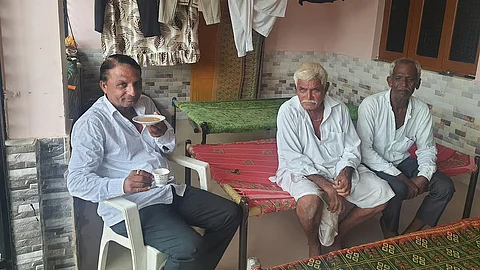

Ukarda, a new panchayat in Banaskantha district, elected its first Sarpanch without a contest
Pushpa Ben Mohan Bhai Nagos became Sarpanch; the panchayat received Rs 3 lakh grant
Gujarat has 761 Samras (unopposed) panchayats out of 4,564 elected in June 2025
Consensus-based elections fetch Rs 3–13 lakh in incentives under Samras Gram Yojana
Villagers plan to use funds to address drinking water shortages and improve basic services
In June 2025, Gujarat conducted 4,564 Gram Panchayat elections, of which 761 villages were elected unopposed under the Samras model—where the Sarpanch and ward members are chosen by consensus rather than through a vote. These panchayats are rewarded with financial incentives to encourage harmony and avoid electoral disputes, a practice promoted since Narendra Modi’s tenure as Chief Minister.
One of the newest entries to this model is Ukarda, a village about 15 km from Palanpur in Banaskantha district.
Until 2023, Ukarda was part of Hasanpura Gram Panchayat, along with Malpuria village. On 23 September 2023, Ukarda received independent panchayat status for the first time. This June, the village prepared to elect its own leadership.
After discussions among village residents, a unanimous decision was taken to elect Pushpa Ben Mohan Bhai Nagos as the Sarpanch, with all ward members also chosen unopposed. Her nomination was the only one filed, and on June 25, 2025, she was formally declared Ukarda’s first Sarpanch.
On July 4, 2025, Gujarat Chief Minister Bhupendra Patel honoured Pushpa Ben along with other unopposed Sarpanches in Gandhinagar. On the same day, the panchayat received a Rs 3 lakh grant under the Samras Gram Yojana via Direct Benefit Transfer (DBT).
Village residents gathered at Pushpa Ben’s house said that drinking water is their biggest concern, and the new funds will likely be used to address shortages.
“This is the first time our village has its own Sarpanch. Earlier, administrative officers hardly took Ukarda seriously. Now we have our own identity,” said an elder at the gathering.
The creation of a separate panchayat has also sparked civic engagement in the village, which previously saw little political participation.
According to the Gujarat Panchayat Department, incentives for unopposed or Samras elections are graded by population and term:
Villages up to 5,000 population:
1st term: Rs 3 lakh
2nd term: Rs 5.75 lakh (includes Rs 2 lakh for CC road)
3rd term: Rs 7.75 lakh (includes Rs 3 lakh for development works)
4th term: Rs 8.25 lakh
5th term: Rs 8.50 lakh
Villages with 5,001–25,000 population:
1st term: Rs 4.5 lakh
2nd term: Rs 7.75 lakh
3rd term: Rs 10 lakh
4th term: Rs 10.5 lakh
5th term: Rs 11 lakh
If the Sarpanch is a woman elected unopposed, incentives rise further: up to Rs 11 lakh for smaller villages and Rs 16 lakh for larger ones, including funds for CC roads and other development works.
With its first unanimous election and grant in hand, Ukarda’s villagers hope that water supply improvements and basic infrastructure will mark the beginning of a new chapter in the village’s political and social identity.
This is Part 3 of our series on Gujarat’s consensus-led panchayats. Read Part 1 on Raningpara and Part 2 on Gathaman [here]. Part 4 publishes tomorrow.